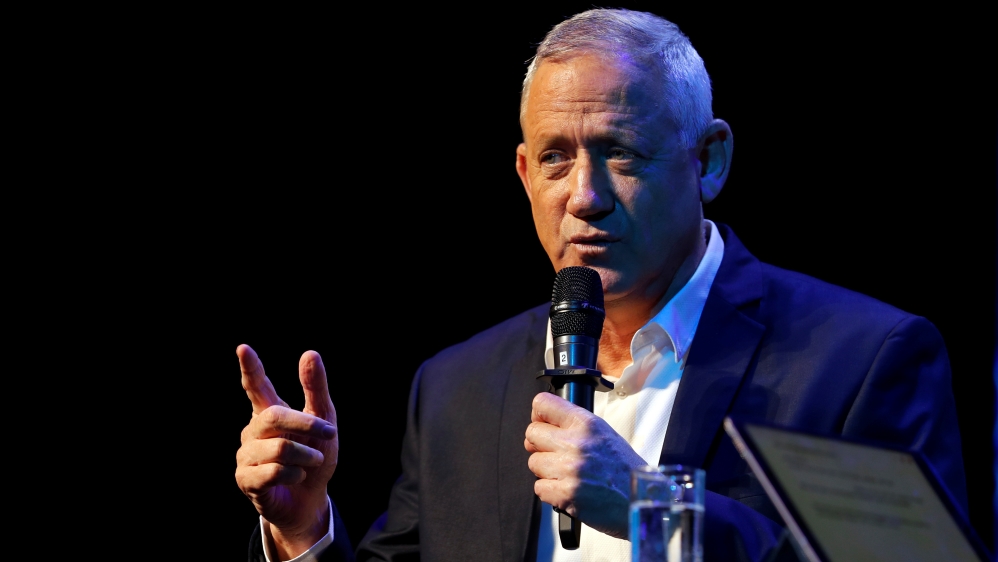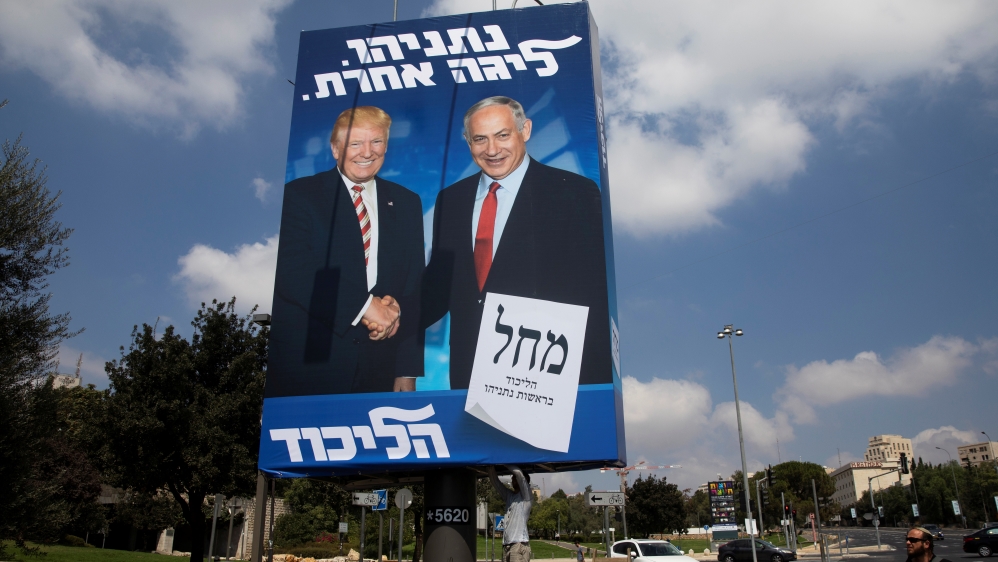Israel election: Five key things to know
Israelis head to the polls on September 17 as PM Benjamin Netanyahu pledges to annex the Jordan Valley if elected.

Israelis head to the polls for a snap general election next week, the second such vote in less than six months.
The vote comes after Benjamin Netanyahu, who is seeking a fifth term as prime minister, failed to form a coalition government in April.
Keep reading
list of 4 items‘Absolute power’: After pro-China Maldives leader’s big win, what’s next?
Solomon Islands pro-China PM Manasseh Sogavare fails to secure majority
Pro-China party on course for landslide victory in Maldives election
Netanyahu, who leads the right-wing Likud party, will have Benny Gantz, a former military chief of staff, as his main rival.
Gantz leads the centrist Blue and White alliance with former finance minister and TV personality Yair Lapid.
Here are five key points to look out for when Israel goes to the polls on September 17:
1. What is expected this time?
On April 9, Netanyahu’s Likud party won 36 out of 120 seats, just one more than Gantz’s Blue and White.
Although Netanyahu won a mandate to form the next government, coalition talks hit a wall and parliament voted to dissolve itself in May.
The snap election scheduled for September 17 will give parties a second chance to form a government. But analysts, as well as the latest surveys and polls, predict little will change.
“The outcome is expected to be quite similar to that of April,” Mayer Cohen, an independent Israeli political analyst, told Al Jazeera.
Diana Buttu, a Haifa-based analyst agreed.
“In the eyes of most Jewish Israeli voters, there hasn’t been a change to push someone to change how they voted in Apri,” she said.
According to two polls published by local media last week, the Likud was projected to win 32 seats, one more than Blue and White.

2. Unity government
No single party has ever won a majority of seats in the Knesset so coalition governments are the norm in Israel.
The leader of the party that wins the most seats is usually given a mandate by Israel’s president to form the new government.
If the person is unlikely to be able to bring together enough parties to control at least 61 seats, the president may give the task to someone else. This is why the leader of the party that wins the election does not necessarily become the prime minister.
To win another term, Netanyahu needs the support of right-wing factions he has previously relied on to clear the 61-seat threshold. Gantz needs the backing of centre-left blocs and the Arab Joint List to find a majority.
But, according to the latest polls by local Israeli media, a right-wing bloc led by Netanyahu is likely to have 56 seats while Gantz’s bloc is expected to muster a total of 55 seats.
Analysts say Israel may end up with a unity government for the first time since Netanyahu came to power in 2009.
“Neither Netanyahu nor Gantz will be able to form a coalition government alone. They will have to form a unity government which brings together the Likud and Blue and White,” said Cohen.
“The only other option will be to hold a third election – something the Israeli public rejects,” he added.
While Buttu agreed a unity government remains a possibility, she said that Netanyahu still had a chance at forming a right-wing government after most of the right-wing parties united as a bloc behind him ahead of the election.
“Netanyahu may be able to form a right-wing coalition this time,” said Buttu. “The only way that this will be shaken up is if they [right-wing parties] don’t get the highest number of seats.”
According to a pre-election poll by the Israel Democracy Institute, the highest rate of Jewish Israeli voters were in favour of a unity government headed by either Netanyahu or Gantz, while the second preference was for a right-wing government led by Netanyahu.

3. Palestinian citizens of Israel could swing vote
Palestinian citizens of Israel include Muslims, Christians and Druze, making up one-fifth of the electorate.
Most traditionally vote for the Arab Joint List – an electoral alliance of four Arab parties – which split into two groups before the April vote but have joined hands for this election.
Although many Palestinian citizens of Israel feel disillusioned by the political process, they could ultimately be game-changers if they vote in large numbers because they tend to vote as a unified bloc.
Their significance as a demographic has led several Jewish political parties to try and win their votes.
“Because the four political parties are united again … [and] Arab Israelis or Palestinians can swing the vote one way or another, there are several attempts to malign them,” said Buttu.
“Jewish parties, such as the left-wing Meretz, launched a huge campaign in Arabic ahead of the vote to try and lure people who would normally vote for the Joint List, while Blue and White has a person doing outreach among Arab voters,” she added.
4. Peace process on the line
The Israeli-Palestinian peace process has not featured prominently in electoral debates leading up to the election, with analysts saying the issue is considered too controversial.
“Although Israel has the opportunity to forge lasting peace with the Palestinians, this issue has featured only lightly among political parties and their campaign messaging,” Nazir Magally, an analyst and expert in Israeli affairs, told Al Jazeera.
|
|
But according to Buttu, while the peace process has been largely ignored, it featured in a unique way during the campaign period, with Netanyahu’s ads focusing on his relationship with US President Donald Trump.
“In the past, candidates would say ‘I am the person to deliver peace… [or] I will bang the Palestinians really hard’ but this time around it is ‘I am the guy who is closest with Trump and you know what Trump has given us’,” said Buttu.
Trump’s policies towards Israel have included the recognition of Jerusalem as Israel’s capital and the transfer of the US embassy from Tel Aviv to Jerusalem. He also recognised Israeli sovereignty over the occupied Golan Heights, seized from Syria during the 1967 war.
The Trump administration is expected to publish the political portion of its Israeli-Palestinian peace plan after the vote. Palestinians dismissed the economic aspect of the plan which was revealed by the US at a conference in Bahrain in June.
“No matter who is voted in, the outcome for the Palestinians will be the same,” Buttu told Al Jazeera.
“There is no peace process, as they [Netanyahu and Gantz] share the exact same ideology [with regards to the Palestinians],” she added.
Earlier this month, Netanyahu reaffirmed promises to annex all illegal Israeli settlements in the occupied West Bank. The move was an attempt to win over voters from some of the more than 400,000 Israelis living in settlements in the occupied West Bank and a further 200,000 in occupied East Jerusalem.
On Tuesday, he reiterated those plans during a speech broadcast live on Israeli TV, saying he will “announce my intention to apply Israeli sovereignty to the Jordan Valley and the northern Dead Sea”.
The Blue and White campaign has remained largely silent on the peace plan, with its leader Gantz evading questions about what solution he proposes for the Palestinians. He maintains his support for a united Jerusalem as Israel’s capital.

5. Netanyahu’s political future
In July, Netanyahu became Israel’s longest-serving prime minister, overtaking the country’s founding father, David Ben-Gurion.
Now, he is not only competing with his toughest opponent in years but also faces the prospect of being indicted on corruption charges, pending the attorney general’s final hearing scheduled for October.
“Netanyahu wants a right-wing government which can provide him immunity against the charges and stop him from being put on trial,” said Cohen.
“There are many questions about Netanyahu’s political future. If he loses, it [his future] will be even more uncertain,” he added.
|
|